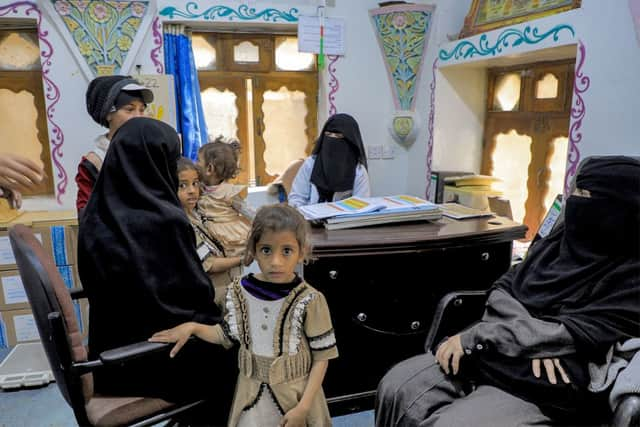UK foreign aid cuts: thousands of women will die in pregnancy and childbirth as a result, warns report
and live on Freeview channel 276
Thousands of women around the world will die as a result of cuts to overseas aid budgets, the UK’s Foreign Office has been warned.
In an internal report published on Wednesday (2 August), the government’s International Development Committee has assessed the “real world” impacts of a foreign aid funding crunch - with a particular focus on the consequences for women’s health, wellbeing, and safety.
Advertisement
Hide AdAdvertisement
Hide AdThe assessment predicts that the cuts will see hundreds of thousands more women in Africa forced into unsafe abortions, while the number of women who die in pregnancy and childbirth as a result of preventable conditions will more than double. In Afghanistan, a 76% cut in aid will leave “some of the world’s most vulnerable women and girls without critical services”, and in Yemen, half a million women and girls will have to go without healthcare.
When the report looked at the effects of the cuts on specific countries in Africa, it warned that in Ethiopa, girls’ education would be severely compromised - and in Somalia, the UK Foreign Office’s programme to counter female genital mutilation may have to be “delayed” or “potentially stopped altogether”. Meanwhile, in South Sudan, more than 100,000 women, girls, boys, and men will not be reached with information on Gender Based Violence rights, prevention, or response.
It comes a month after the Foreign Office published its programme allocations for the next two years, showing that spend for official development assistance (ODA) is due to rise marginally in 2023 - 2024, and then increase by 12% in 2024 - 2025. These projections by themselves signal an increase, but because the government has still not returned spending to pre-pandemic levels, (when it was temporarily reduced from 0.7% of gross national income to 0.5%), they actually represent a decrease in aid.
In a statement, the Foreign Office said its budget for low-income countries has been cut in the short-term in order to hit a savings target, but will then nearly double.
Advertisement
Hide AdAdvertisement
Hide Ad

Many of these reductions were imposed on the Foreign Office after the Treasury allowed the Home Office to spend about a quarter of the aid budget housing refugees in the UK, the report says. This is allowed under international rules for the first year of a refugee’s stay - but the arrival of so many asylum seekers has sent costs soaring, meaning less can be spent on the government’s priorities overseas.
Commenting on the report, which has offered a far more detailed insight into the impact of cuts than previous governments in an attempt to improve “transparency”, development minister Andrew Mitchell has insisted that despite an overall spending crunch, foreign aid would still increase next year - with almost double being allocated to Africa.
He also emphasised that, in an attempt to soften the blow of some of the cuts, the Foreign Office has used “in-year underspends and other resources” to find money to spend on aid this year, including a further £41 million for Afghanistan, £32 million for Yemen, £30 million for Syria, and £30 million for Somalia.
But Labour’s Sarah Champion, chair of the International Development Committee, said the impacts of the cuts were “absolutely horrific”. According to the MP, the spending reductions do not align with the Foreign Office’s “recently restated commitment to ‘persuade more of our fellow citizens that international development is core to our own national interest as well as the right thing to do’” - which she argued means the cuts will be a “further political hit” to the UK’s “leadership on global and regional programmes”.
Advertisement
Hide AdAdvertisement
Hide AdSpeaking to BBC Radio Four’s Today programme, she added that while a Labour Party government would not be able to immediately restore the foreign aid budget, it would still prioritise helping the most marginalised people. She explained: “The UK has been an incredible leading light [in foreign aid]. It’s given us enormous reach, enormous credibility, and so to continue to throw that away as has been happening is not something we’re planning on doing.”
A Foreign Office spokesperson said: “UK aid spending is due to increase to £8.3 billion next year, and will be focused on programmes addressing humanitarian crises, protecting women and girls and supporting the world’s most vulnerable, while delivering value for money for taxpayers.
“While the budget for low-income countries has had to be reduced in the short term to achieve our savings target, it is due to nearly double for these countries the year after, including in Africa where aid will rise from £646 million to £1.364 billion.”
Comment Guidelines
National World encourages reader discussion on our stories. User feedback, insights and back-and-forth exchanges add a rich layer of context to reporting. Please review our Community Guidelines before commenting.
